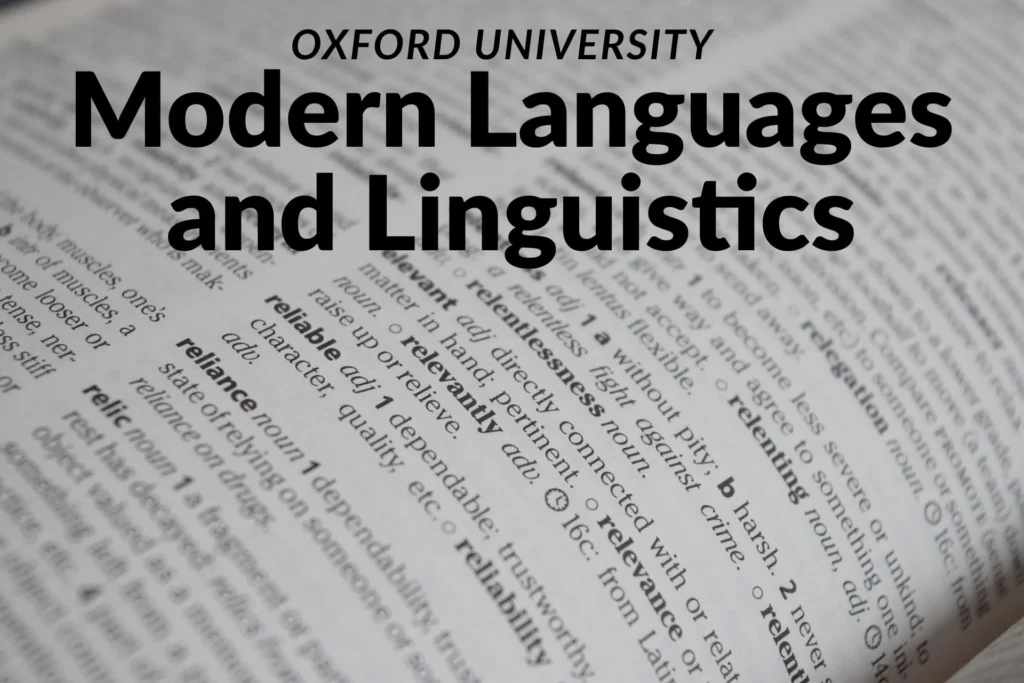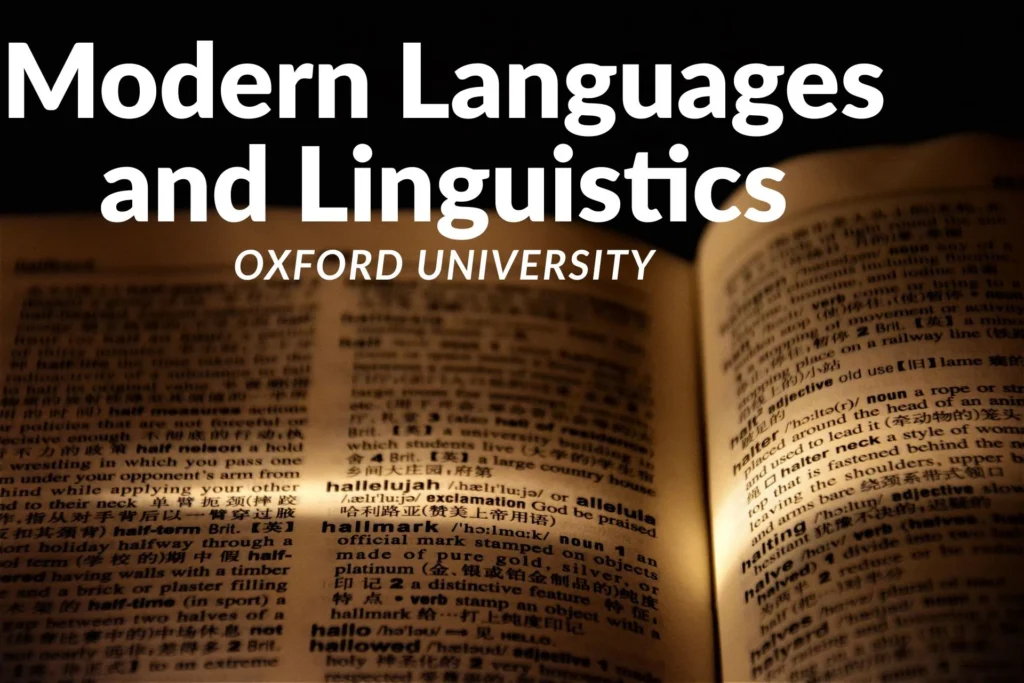Modern Languages
Linguistics is a profound exploration of the essence of human communication culture and thinking. If you are enthusiastic about gaining not only fluent knowledge of a foreign language but also a theoretical understanding of how language operation the course in Modern Languages and Linguistics at Oxford is the best option. The full-time four-year course leading to a certificate of Bachelor of Arts is intense and based on the understanding of the youth and willingness to explore. It is a year abroad with compulsory studies that help students acquire full fluency as well as an authentic structural picture of the language with its cultural context.
Modern Languages and Linguistics
The core appeal of this degree lies in its unique dual focus. Students are not simply learning a language, they are simultaneously dissecting the very mechanisms that underpin all human language. This synergistic approach ensures that graduates possess both a high-level practical competence and a sophisticated theoretical framework. The interdisciplinary nature of modern languages and linguistics is what sets it apart, providing a holistic education that is both culturally rich and scientifically rigorous.
The Modern Languages component involves intensive development of practical skills—speaking, listening, reading, and writing—alongside an exploration of the literature history and culture of the chosen language. This holistic immersion provides the essential cultural context that transforms a language learner into a true communicator.
The Linguistics component on the other hand introduces students to the scientific analysis of langu3age. This is where the intellectual rigour of the course truly shines, covering fascinating topics such as:
- Phonetics and Phonology: The study of speech sounds and how they are organised in different languages.
- Morphology and Syntax: How words are formed and how they combine to create grammatical sentences.
- Semantics and Pragmatics: The study of meaning in language and how context influences interpretation.
- Psycholinguistics: The exploration of how language is acquired processed and organised in the brain.
The The Faculty of Linguistics Philology and Phonetics at Oxford University is a world-renowned centre of expertise in these areas particularly in general linguistics and the history and structure of many individual European languages and language families. This dedication to deep specialized knowledge makes the BA in Modern Languages and Linguistics a truly exceptional programme. This rich academic environment ensures that the theoretical study of what human language is and how it works is constantly reinforced by the detailed study of language structure and change applied to the specific language a student is mastering. The resources and faculty commitment at Oxford University are second to none providing an ideal setting for this demanding joint degree.

Course Structure and Academic Life
The four-year course is structured to provide a solid foundation in the first year followed by increasing specialisation and a transformative year abroad.
Year 1: Foundations and First Examinations
The initial year is designed to be comprehensive and highly structured ensuring all students achieve a high standard across both disciplines. The tutorial system, a hallmark of Oxford University education, is central to this intensive learning experience.
| Component | Focus Areas | Assessment |
|---|---|---|
| Modern Language | Practical language work (grammar, translation, oral skills) and the study of important literary works and cultural topics. | Two written papers for practical language and two for literature/culture. |
| Linguistics | General linguistics, phonetics and phonology, morphology, syntax, and semantics and pragmatics. | First University Examinations: You’ll sit six or seven written papers, covering translation as well as literature. |
The teaching is delivered through a combination of lectures language classes and the famous Oxford tutorial system. Tutorials typically involving just two or three students and a world-leading expert tutor are intense personal and highly effective learning opportunities centred on discussion and debate around a piece of student-produced work.
Years 2 and 4: Specialisation and Final Honours
During the second and fourth years the focus is more on specialization and in the fourth year endures until one can take it to different areas one wishes to major in. The final emphasis of the course is on the final examinations and assessment before acquiring the BA degree in the fourth year where the unprecedented possibilities and areas of application for the pupil are tremendous in these last years. These three years constitute the most advanced degree of the course where the interdisciplinarity becomes evident in modern languages and linguistics.
- Modern Language which is a practical language work at a more advanced level a focused period and an optional further subject.
- Linguistics which majors in general linguistics the history of the language of modern equivalent and of the structure and use of that language.
- Specialist grammars and options whereby the student may select one or two specialist grammars these may be more advanced and specialized for instance Syntax Semantics and Pragmatics Psycholinguistics, or a linguistics project.
Final examination in the end from the fourth year there are eight or nine papers, including the oral examination which concludes by being awarded the BA degree.
The Compulsory Year Abroad (Year 3)
A defining feature of the degree is the compulsory third year spent abroad which is crucial for achieving the high level of fluency expected of graduates in modern languages and linguistics. Students must spend at least 24 weeks in an immersive target language environment. This practical immersion is the final essential component of the modern languages and linguistics curriculum. Opportunities are varied and include:
- Working as a paid language assistant in a school.
- Undertaking a professional internship.
- Studying at a partner university.
Oxford University actively works with European partners to maintain these vital opportunities post-Brexit ensuring that university exchanges, language assistantships and work placements remain available. Furthermore UK students from lower-income households with means-tested assessments remain eligible for Oxford’s generous bursary provision with travel grants and hardship funds also available through the college and Faculty.
Admissions and Requirements
Gaining a place to study modern languages and linguistics at Oxford University is highly competitive, but the requirements are clear.
Academic Requirements
The typical conditional offer is AAA at A-level or 38 points (including core points) with 666 at Higher Level in the International Baccalaureate (IB).
Subject Requirements:
- Essential: For most languages (French, German*, Modern Greek*, Italian*, Portuguese*, Russian, and Spanish), candidates are usually expected to have the language to A-level or equivalent. If you don’t have this qualification, You can still be considered if you’ve reached B1 level on the CEFR (Common European Framework of Reference for Languages).
- Beginners’ languages: You can start German, Modern Greek, Italian, or Portuguese from scratch with Linguistics—no prior A-level study in the language is required.
- Linguistics: No prior experience of studying Linguistics is required.

The Admissions Test (MLAT)
Admissions test: Most applicants will need to take the Modern Languages Admissions Test (MLAT) as part of their application. The MLAT is typically taken in late October and is not required for Linguistics with a Beginners’ Language. The test assesses language-specific skills and aptitude.
Career Prospects
The combination of rigorous analytical training from linguistics and highly developed practical competence in a language makes graduates of modern languages and linguistics exceptionally well-equipped for a diverse range of careers. This is why the degree in modern languages and linguistics is consistently ranked as one of the most employable.
The transferable skills acquired over the course of the degree are highly valued by employers across all sectors:
- Communication and persuasive argument.
- Critical thinking and analysis.
- Creative problem solving.
- Empathy and understanding alternative perspectives.
Recent graduates from Oxford University have gone on to successful careers as management consultants brand marketing managers market researchers and psychology lecturers demonstrating the broad applicability of the degree. As one alumnus Joe, a former Head of Languages, noted: “Investigating languages demands diligence, focus and determination, the course also developed many critical skills that are essential for interesting careers – analytical reading, discussion, listening skills, presentation skills, and a keen writing style. “Thank you Oxford!“
Why Choose Oxford University
The prestige and resources available at Oxford University elevate the study of modern languages and linguistics beyond what is offered elsewhere. The faculty’s commitment to both deep research and outstanding undergraduate teaching is what truly distinguishes the modern languages and linguistics programme.
- Historical Excellence: Modern Languages has been taught at Oxford since 1724, a tradition of excellence that few other UK universities can match.
- Unrivalled Resources: Students benefit from the Taylor Institution Library, the biggest research library in Britain devoted to modern languages, as well as the central Bodleian Library. The University’s well-equipped Language Centre further supports students with tailored study materials.
- Reputation: While rankings vary, Oxford consistently places at the very top of UK university league tables for Modern Languages, often competing for the top spot with St Andrews and Cambridge.
Choosing to study modern languages and linguistics at Oxford University is an investment in a future defined by intellectual curiosity, cultural fluency, and professional versatility. It is a course that not only teaches you to speak a language but teaches you how to think about language itself, preparing you for a world that increasingly values global understanding and analytical depth.
Financial Considerations and Support
Understanding the financial commitment is a key part of the application process.
Fee Status | Annual Course Fees (2025/26 Guide) |
Home | £9,535 |
Overseas | £43,600 |
Financial Support:
- Home Students: A tuition fee loan is available from the UK government. Oxford University also offers one of the most generous bursary packages in the UK for Home students with a family income of around £50,000 or less.
- Year Abroad Fees: During the year abroad, students pay significantly reduced fees to the University (e.g. Home students pay approximately 15% of the fee cap).
- Living Costs: Estimated living costs for the academic year starting in 2026 are between £1,405 and £2,105 per month while in Oxford.
The comprehensive financial support available particularly the generous bursaries from Oxford University ensures that a world-class education remains accessible to talented students regardless of their financial background. This commitment to accessibility is a core value of Oxford University.
Application Guidance
To maximize your chances of securing a place applicants are encouraged to demonstrate a clear passion for languages and linguistics in their personal statement.
- Personal Statement: Go beyond simply listing extra-curricular activities. Discuss what you thought of the French film you watched or the classic Italian literature you read. Your ability to engage critically with culture and language will be explored in the interview.
- Interview Preparation: The interview is an exploration of how you think. Be prepared to discuss your personal statement and to engage with unfamiliar texts. Tutors are looking for solid grammatical knowledge and a willingness to engage in intellectual debate.
Specialised support is available to help applicants navigate the complex admissions process for modern languages and linguistics at Oxford University from cultivating bespoke reading lists to preparing for the MLAT and mock interviews. This tailored guidance can be invaluable in helping you secure a place on this prestigious course, a goal that many aspire to achieve at Oxford University.
Conclusion
The BA in Modern Languages and Linguistics at Oxford University is more than a degree, it is an educational experience. It is not only the practical skill of language that the BA in Modern Languages and Linguistics offers. Still equally or rather even more an analytical approach to the phenomenon of language and communication that allows graduates to master any foreign language but more importantly to master communication critical thinking and understanding other cultures. Therefore this degree makes its graduates highly demanded earners equipped for surviving and achieving in a globalised world.
